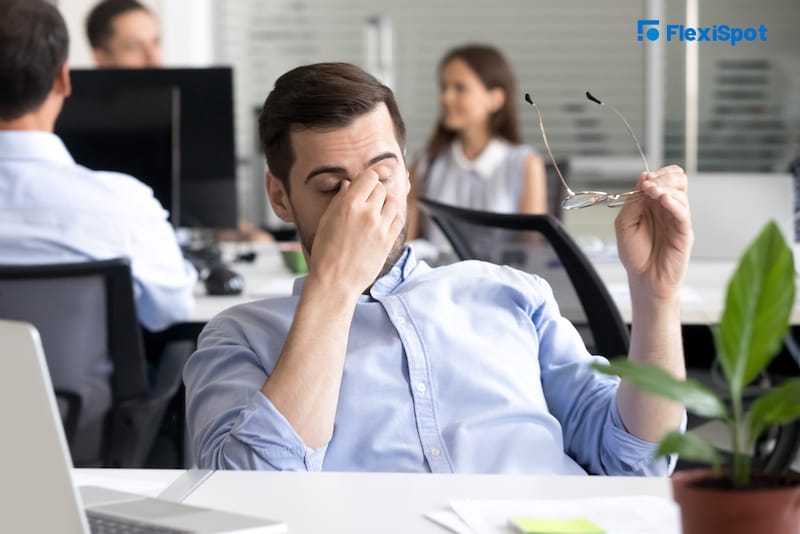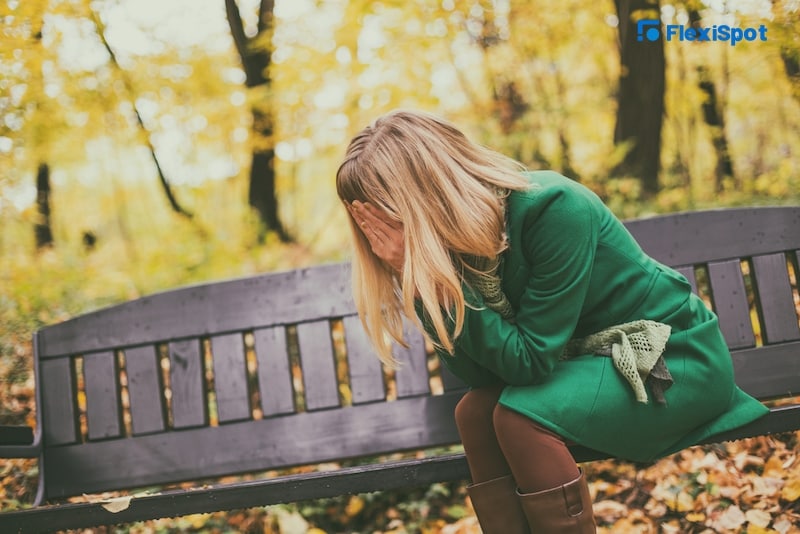It’s time for the greens to turn to reds, oranges, and yellows as pool time and summer holidays make their exit to give way to autumn. Many reports have, over time, suggested that workplace anxiety is at its peak in autumn. In fact, anxiety resulting from personal and professional stress is believed to be very high in the fall.
But is autumn synonymous with anxiety?
Medical experts describe Autumn Anxiety as a mood downturn that most people experience during the autumn months. Anxiety seems to be high during these months for many people and recurs annually. Experts have explained that there isn’t a specific trigger; as a matter of fact, most people don’t realize they are experiencing autumn anxiety.
The Fall anxiety pattern became apparent to medical experts over time, which led to many divided opinions on the matter. On the one hand are people who don’t believe autumn anxiety is a thing. On the other hand are people who are finally identifying what’s been happening to them when fall comes. This set off a lot of studies into the matter in different parts of the world, which bore extensive reports on autumn anxiety, what causes it, and how you can prevent it.
Common symptoms of autumn anxiety
There are a lot of things that might clue you in on autumn anxiety taking hold of you. These include:
Low mood and depression
As the leaves start to fall, so does your mood. You barely feel like doing anything. You can go for extended periods without interacting with people, and when you do, you’re often in a low mood. This is a common symptom.
Excessive worry
It is during the autumn months that a lot of people begin to worry. Some worry about the coming year, others about the ending year, and a plethora of things that need attention. This excessive worry is an indicator that you are experiencing anxiety.
Irritability
You might find yourself feeling irritable by the smallest things. Don’t fret; this might be a result of autumn anxiety.
Fatigue
You are tired, sleepy, and lethargic most of the time. This is also an indication that you might be experiencing fall anxiety.
Is it really autumn anxiety or something else?
Admittedly, it is hard to believe that seasonal anxiety exists. So, it is quite understandable to wonder whether this actually happens. The truth is that medical experts have concurred that changes in seasons can bring with them mood changes and anxiety. Despite this, autumn anxiety is not a recognized condition, but it explains what happens to most people in fall.
The reason why it is known as autumn anxiety is because of the changes taking place. Psychologists have explained that transitions can cause anxiety. And in autumn, the weather changes, shorter days, and longer nights require an adjustment that can be stressful. This is in addition to back-to-school stress for students and work stress for workers.
Therefore, Autumn anxiety is real, but so is stress resulting from other seasonal changes throughout the year. The only difference is the causes of each particular anxiety.
Does everyone experience autumn anxiety?
No!
While this might affect quite a number of people, others thrive during the fall months. Moreover, if you experience autumn anxiety one year doesn’t mean you experience it every year. It is all dependent on various factors happening during the time.
What are the causes of autumn anxiety?
Now that you know the symptoms you might experience if you’re going through fall anxiety. It is time to understand what causes it.
1. Reduction in sunlight
Once summer exits, sunlight hours are also reduced. The reduction in sunlight leads to a fall in serotonin levels. According to experts, fewer daylight hours lead to the release of the hormone melatonin, which makes people depressed and sleepy. Without serotonin, there is little control of your mood, sleeping patterns, and appetite.
The reduction of sunlight also means that people get less vitamin D. This is also linked to mood changes and depression. People also get fewer sunlight hours because the weather change in fall makes more people spend time indoors. This means less exercise and activity is essential for boosting your mood.
2. Workplace stress
Workplace stress is a constant throughout the year, but it has been found to peak during the autumn months. The explanation for this is that people feel they are running out of time in the year. Autumn brings with it a reality check that the year is ending. Therefore, unaccomplished goals begin to haunt you, and you feel short of time to make plans for the next year.
Workplace anxiety can also result from working long hours, leading to burnout. Until recently, ‘hard work’ has been considered the only path to success. To many people for decades, this meant sacrificing many parts of their life to pursue their careers. Resulting from this, the current age has seen people prioritize their work over everything else. Even though this is starting to change, it has led to a lot of stress and negativity that has affected many workers.
For people struggling to achieve a healthy work-life balance, autumn might bring with it a feeling of doom. This is because they have many deadlines to meet before the year ends. They also need to make plans for the next year, and all this during the busiest time of year as holidays begin to check-in. People, therefore, feel more anxious in the fall for these reasons. However, workplace stress also contributes to this.
3. Looming holiday season
Holidays can be stressful. There is so much that goes into making the holidays perfect, and with everything happening in life, it is easy to drop the ball on a couple of things. We can’t forget to highlight the one-sided holiday ‘competitions’ that most people engage in. This is where you find yourself trying to make your holiday decorations better than your neighbor or the rest of your family and friends.
Away from that, accommodating family and friends over the holidays can also be quite stressful. The reality of the amount of work that goes into making the holidays often starts to sink in for most people in autumn. Fall months become a time for panic shopping, rushed holiday plans, and wishing the holiday season was far behind you.
This is not to say that people don’t enjoy the holidays. Holidays are fun; the planning that goes into it, however, is not so much.
4. Regret and uncertainty
The start of autumn marks the beginning of the end of the year. Therefore, many people begin to take stock of what they have achieved and what they haven’t. Are you where you thought you would be by this time of the year? If there are things you haven’t accomplished, it can leave you with feelings of regret, which breeds anxiety.
As you try to wade through these feelings, the glaring reality of an upcoming year also hits you hard. You need to start making plans for the new year, yet you don’t want to carry forward unfinished goals from the previous year. This makes autumn a very stressful time for many people.
What can you do?
Whatever it is that is causing you stress and anxiety in autumn; you can get some much-needed relief through the following:
Get more light
Though the weather might be perfect for staying indoors, it is vital that you spend some time outdoors. Get some natural light, especially early in the morning. If you’re not getting any light at all, you can use light therapy boxes that have been proved to help people by simulating the sun rising.>
Exercise
Daily exercises will help you stay active. You just need 30 minutes of exercise to make your day better. You can take long walks, go on bike rides or even have your workout at home. The important thing is that you spend some time exercising every day.
Watch your diet
Diet changes can do wonders for your mood and wellbeing. Autumn is a great time to rethink some of your dietary habits. Get into seasonal soups and dive into warm meals that are healthy and wholesome to help you improve your mood and boost your health.
Try something new
You might feel burdened by everything you need to get done before the year ends, but you can still start a new hobby. You can also learn something new that you’ve been hoping to do. This will help you keep active and excited for each day.
Focus on the positives
One of the reasons why autumn anxiety recurs is because people have associated fall with negative experiences. However, reframing your outlook might help you enjoy autumn a whole lot more. Therefore, rather than focusing on the negatives of autumn, highlight the positives and revel in them.
To conclude:
Autumn is here, so when you feel anxious and depressed, it is important to take action to change this. Most times, you can manage this by yourself through the ways outlined above. However, if you feel things are getting worse, seek professional help!





